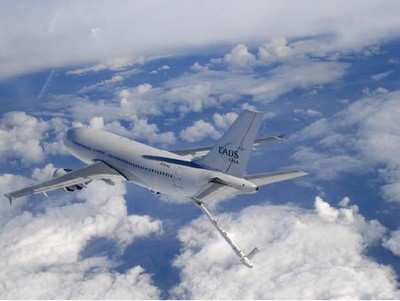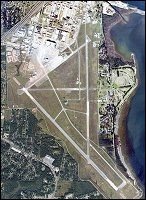KC-30 To Compete Against Boeing's KC-767
In a release Thursday, Northrop Grumman says it will respond to
the US Air Force's request for proposal (RFP) for a tanker aircraft
to replace its aging fleet of KC-135 Stratotankers.

In its release Northrop's corporate vice president and president
of integrated systems Scott Seymour said, "The next-generation
tanker is vital to our nation's power projection capabilities
around the world for decades to come. After carefully studying the
final language in the Air Force's KC-X request for proposals, we
and our team members have determined that the Northrop Grumman
KC-30 is a very competitive offering that fully supports the Air
Force's tanker mission."
This sets the stage for a showdown between the world's two
largest commercial aircraft manufacturers in the competition for
what could potentially be the largest military contract in US
history -- up to $100 billion.
Northrop/Airbus will offer a variant of Airbus' A330 commercial
airliner fitted with a refueling boom (above), and appropriately
modified to haul more fuel. The consortium has dubbed it the
KC-30.
Boeing plans to put forward a modified 767 it's calling the
KC-767.
Boeing brings nearly 60 years experience in building, modifying
and maintaining air refueling aircraft to the table, while Airbus
is a relative newcomer. The UK and Australia have already
contracted with Airbus for its KC-30, while Boeing has sold KC-767s
to Italy and Japan.
Should Boeing win the contract it would breathe new life into its 767
line, and keep the production facility open for many
years to come; should it lose, the line will likely shut down in
the very near future.
 Northrop and Airbus have
selected a Mobile, AL facility to
perform all the completion work on the A330 airframes coming from
Europe. The Mobile plant would mean big money for the local economy
bringing some 1,000 jobs.
Northrop and Airbus have
selected a Mobile, AL facility to
perform all the completion work on the A330 airframes coming from
Europe. The Mobile plant would mean big money for the local economy
bringing some 1,000 jobs.
As ANN reported, the
Northrop-Airbus partnership had hinted it wouldn't submit a
proposal if it felt the requirements listed in the RFP might tilt
the playing field too far in Boeing's favor, leaving some to
speculate the whole acquisition program might be in trouble if
Boeing were left as the only offering.
Boeing's credibility as a military contractor took a big hit
three years ago when a lease-back deal approved by the Pentagon
came under congressional fire. The sordid scandal resulted in jail time for the
military acquisition officer who approved the $23.5 billion deal
(an inflated price) just before retiring and accepting a cush job
with Boeing. Later fall out included a rash of firings and
resignations of many top executives at the company.
The USAF took its share of knocks in
the scandal as well. A Pentagon IG report filed months after the
deal fell through noted the service "demonstrated neither best
business practices nor prudent acquisition procedures to provide
sufficient accountability for the expenditure of $23.5
billion."
This time around, the USAF says it has engaged in "extensive and
transparent dialogue" between it and officials from the Office of
the Secretary of Defense, Air Mobility Command, industry and
members of Congress with every intention to minimize development
risks among differing aircraft manufacturers and types.
Northrop's Seymour said, "We appreciate the Air Force
acquisition authority's process transparency and invitation for
industry dialogue which have resulted in this very comprehensive,
capabilities-based final request for proposal. We look forward to
submitting a proposal that will provide the Air Force with the
best-value, next-generation tanker possible for our future
warfighters."
So... the board is set, the pieces arranged, the playing field
level and square -- let the battle begin!
 NTSB Final Report: Patriot Aircraft LLC CX1900A
NTSB Final Report: Patriot Aircraft LLC CX1900A Aero-News: Quote of the Day (12.06.25)
Aero-News: Quote of the Day (12.06.25) ANN's Daily Aero-Term (12.06.25): High Speed Taxiway
ANN's Daily Aero-Term (12.06.25): High Speed Taxiway ANN's Daily Aero-Linx (12.06.25)
ANN's Daily Aero-Linx (12.06.25) Airborne-NextGen 12.02.25: Honda eVTOL, Arctus High-Alt UAS, Samson Patent
Airborne-NextGen 12.02.25: Honda eVTOL, Arctus High-Alt UAS, Samson Patent




